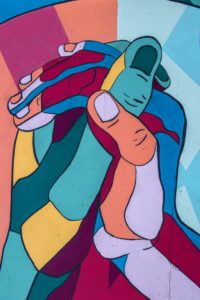How can teachers find, build & share resources and content to support Develop an awareness of the potential of Human-Centered Learning in Online and Open K-12 Learning Contexts learners in K-12 online & open digital contexts? What did I already know, what do I know now based on the course readings and activities, what do I hope to learn?
Topic one of this course gave me a better understanding of what human-centered learning is and the importance of it. Verena takes some key points from our readings, which break down what human-centered learning is. I found this helpful, as I initially wasn’t exactly sure what the term meant. For example, communication, relationship and connection building, extending definitions around “success”, creating relevancy to learning, etc. are all important aspects of human-centered learning. So, how can teachers find, build and share resources and content to support human-centered learning in an online and open context?

Photo retrieved from Unsplash by Markus Winkler
The readings from topic four provide examples and information related to open education resources and the importance of it. Kimmons (2015) defines open education resources (OER) as “educational materials that are in the public domain or introduced with an open license” (p. 40, 2018). Roberts and Noble’s article (2020) indicated that from their research around OER that there was a lack of awareness around the concept, but that people do understand the importance of collaborating and sharing. In theory, OER sounds easy, but copyright and restrictions can potentially make OER somewhat limited. That is why Roberts and Noble (2020) suggest creating digital content on platforms that allow the option to have material open for learners to use. When creating your own material, you can ensure that it is relevant to the students. That would be an example of how to build and share OER. Another example in terms of building OER came from Wiley and Hilton’s article (2018) and the example they gave was students in a course giving future students “deeper explanations of concepts, study guides for exams, tutorial videos that provide scaffolding and support to learners who benefit from having the material presented from a different perspective or in a different medium” (p. 138, 2018). This example reminds me of the importance of UDL and how all students learn differently, so by receiving information from a different perspective this could potentially help students. It also is a way that promotes communication, as well as building connections and relationships. With this example, they also address the fact that students cannot be required to share their work, “however, faculty can espouse the benefits of openness and appropriately advocate for students to license their works under a Creative Commons License” (p. 144, Wiley and Hilton, 2018). This website helped me understand what Creative Commons License is.
In terms of teachers finding resources (open or not), I believe creating connections within your community will help with this. Connecting with others, using the library and the Internet are also good examples.
Roberts and Noble (2020) explain that to develop knowledge, people should be given the opportunity to have access to the “same learning opportunities regardless to geography, culture or technology” (p. 7, 2020). OER can be created in a way that would achieve this and bring many other positives for learners and educators. I will continue to research OER as I continue on my pathway of becoming a teacher and look forward to see what will come out of it over time. I believe that by collaborating with others, using platforms (ex. Twitter) and the resources provided to us it will help support learning.
References:
Kimmons, R. (2015). OER quality and adaptation in K-12: Comparing teacher evaluations of copyright-restricted, open, and open/adapted textbooks. The International Review of Research in Open and Distance Learning. 16(5), 39–57. https://doi.org/10.19173/irrodl.v16i5.2341
Roberts, V. (2020). Topic 1. Retrieved from https://edtechuvic.ca/vroberts/2020/07/05/topic-1-july-6-9-introductions-privacy-and-human-centred-learning/
Roberts, V. & Noble, S. (2020). Developing a Creative Commons Mindset: The Practical Aspects of OER from a K-12 Alberta School District Perspective. [Weblog]. Retrieved from http://verenaroberts.ucalgaryblogs.ca/2020/06/25/deve loping-a-creative-commons-mindset-the-practical-aspe cts-of-oer-from-an-k-12-alberta-school-district-perspect ive/
Wiley, D. & Hilton, J. (2018). Defining OER-enabled Pedagogy. International Review of Research in Open and Distance Learning, 19(4). http://dx.doi.org/10.19173/irrodl.v19i4.3601



Recent Comments